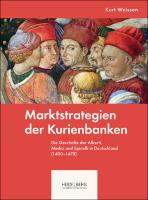Marktstrategien der Kurienbanken
Double-Blind-Peer-Review overseen by Publisher
Die Geschäfte der Alberti, Medici und Spinelli in Deutschland (1400–1475)
Author(s)
Weissen, Kurt
Collection
AG UniversitätsverlageLanguage
GermanAbstract
With their branch networks and partners, the Florentine banks dominated international monetary transactions of the 15th century. Thanks to their presence in the main commercial centres of the continent, the merchant bankers from Tuscany dominated the cashless processing of large transfers of money from all over Europe to the Roman Curia. Kurt Weissen examines how curia bankers, such as the Alberti and the Medici, connected Germany to this payment system via Bruges and Venice. He analyses the role played by the establishment of branches in Lübeck, Cologne, Basel and Constance and the importance of cooperation with German merchant companies. Die florentinischen Banken beherrschten mit ihren Filialnetzen und Partnern die internationalen Geldgeschäfte des 15. Jahrhunderts. Dank ihrer Präsenz an den wichtigen Handelszentren des Kontinents dominierten die Händler-Bankiers aus der Toskana die bargeldlose Abwicklung der großen Geldtransfers aus ganz Europa an die römische Kurie. Kurt Weissen untersucht, wie Kurienbankiers wie die Alberti und die Medici Deutschland von Brügge und Venedig aus an dieses Zahlungssystem anschlossen. Er zeigt auf, welche Rolle dabei die Gründung eigener Niederlassungen in Lübeck, Köln, Basel und Konstanz spielten und welche Bedeutung Kooperationen mit deutschen Handelsgesellschaften zukam.
Keywords
Economic history Middle Ages; Relations Germany-Italy; Medici Bank; Pontifical Finance; Bank History; Wirtschaftsgeschichte des Mittelalters; Deutsch-Italienische Beziehungen; Päpstliche Finanzen; BankgeschichteDOI
10.17885/heiup.675ISBN
9783968220208, 9783968220215, 9783968220222, 9783968220208Publisher
Heidelberg University Publishing (heiUP)Publisher website
https://heiup.uni-heidelberg.de/Publication date and place
Heidelberg, 2021Classification
Economic history


 Download
Download Web Shop
Web Shop